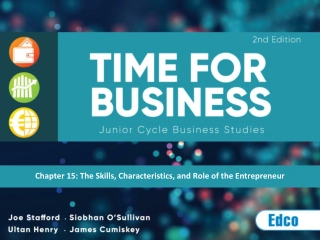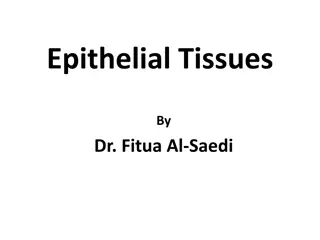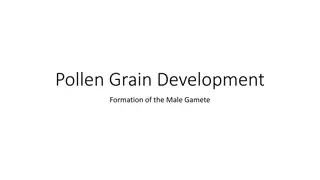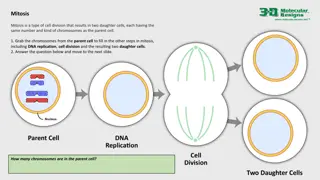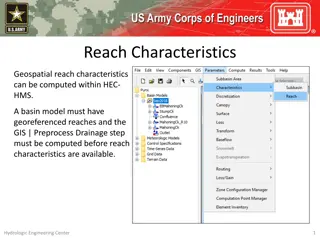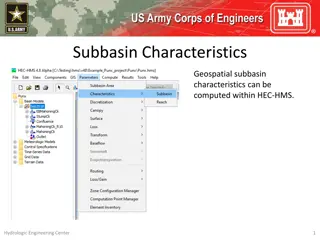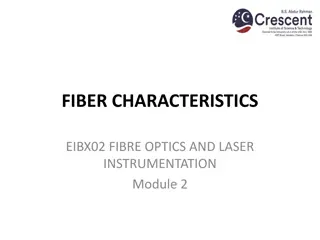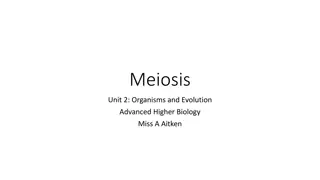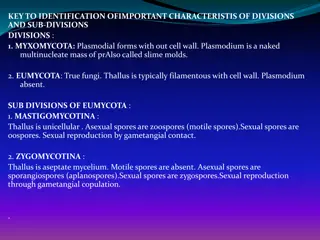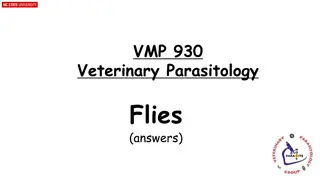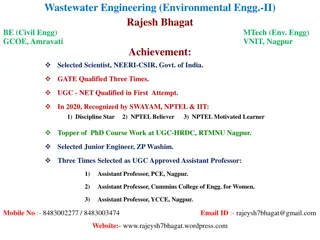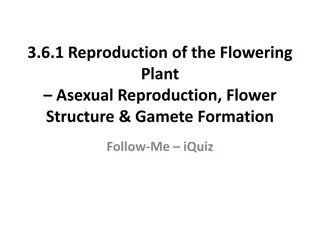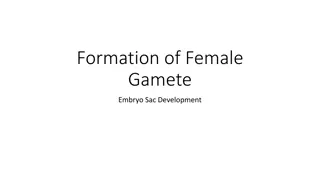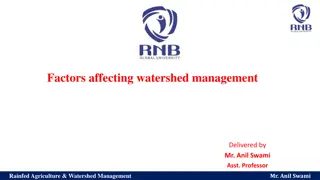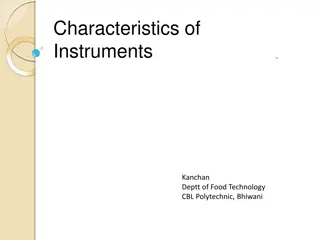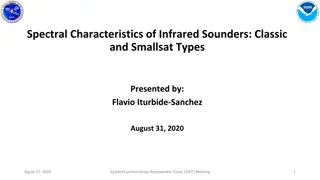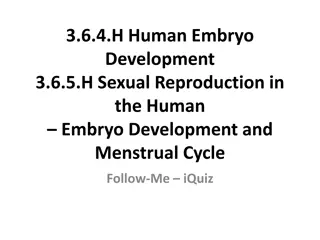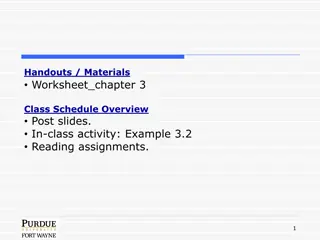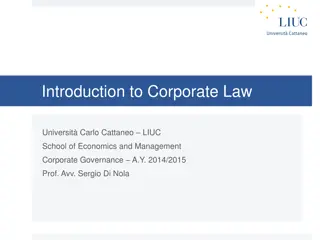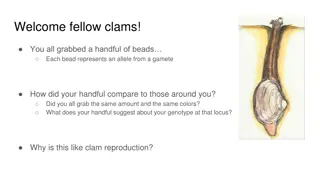Unlocking Entrepreneurial Skills and Characteristics
Explore the dynamic world of entrepreneurship in Chapter 15, focusing on the essential skills, characteristics, and role of an entrepreneur. Learn about the diverse categories of enterprise, the motivations behind starting a business, and how entrepreneurs contribute to society and the economy. Disc
1 views • 39 slides
Understanding Epithelial Tissues: Types and Characteristics
Epithelial tissues are integral to the human body, forming sheets of cells that cover internal and external surfaces. Derived from all three primary germ layers, epithelia exhibit distinct polar characteristics and rely on connective tissue support. There are two main types of epithelial tissues –
1 views • 16 slides
Pollen Grain Development
The process of pollen grain development and formation of the male gamete involves crucial stages such as the presence of diploid microspore mother cells in the stamen, meiosis resulting in the formation of four haploid cells and tetrads, mitosis leading to the development of two haploid nuclei in ea
0 views • 6 slides
Cell Division Processes: Mitosis and Meiosis Explained
Mitosis and meiosis are two types of cell division processes with distinct outcomes in terms of chromosome numbers. Mitosis results in two daughter cells with the same number of chromosomes as the parent cell, while meiosis produces four gamete cells with half the chromosome number. This explanation
2 views • 5 slides
Understanding the Characteristics of Living Things
Living things, known as organisms, exhibit essential characteristics including being made of cells, requiring nutrition, excreting wastes, responding to changes in their surroundings, and reproducing. They are classified into different groups such as bacteria, fungi, plants, animals, and others like
2 views • 33 slides
Understanding Reach Characteristics in HEC-HMS Basin Modeling
Reach characteristics play a crucial role in hydrological modeling using HEC-HMS. Georeferenced reaches are essential for computing reach characteristics like slope, sinuosity, relief, and more. The process involves pre-processing drainage data before detailed reach characteristics can be obtained.
0 views • 5 slides
Assisted Reproductive Technologies: Gamete Intra-fallopian Transfer (GIFT)
Assisted Reproductive Technologies (ART), such as Gamete Intra-fallopian Transfer (GIFT), offer a method for couples struggling with infertility. GIFT involves placing fertilized eggs in the fallopian tubes, unlike In Vitro Fertilization (IVF). The procedure requires healthy fallopian tubes and offe
1 views • 25 slides
Essentials of Management: Understanding Concepts, Characteristics, and Functions
The chapter explores key aspects of management, including its definition, objectives, and characteristics. Management is depicted as the process of achieving organizational goals effectively and efficiently through planning, organizing, staffing, directing, and controlling resources. Various definit
2 views • 5 slides
Understanding the Differences and Characteristics of BJT and FET in Electronics
Learn about the disparities between Bipolar Junction Transistors (BJT) and Field-Effect Transistors (FET) in this informative content. Explore the construction, operation, and characteristics of these semiconductor devices, including N-channel JFET specifics, operating behaviors such as pinch-off, d
2 views • 9 slides
Understanding Subbasin Characteristics in HEC-HMS
Subbasin characteristics play a crucial role in hydrological modeling within HEC-HMS. Before computing these characteristics, the basin model must have georeferenced subbasins in the GIS. Various parameters such as basin slope, relief, elongation ratio, drainage density, and flowpath lengths and slo
0 views • 13 slides
Exploring the 7 Key Characteristics of Sound Waves
Dive into the fascinating world of sound waves with an exploration of their 7 essential characteristics. Learn about attributes such as amplitude, frequency, phase, velocity, wavelength, harmonics, and envelope (ADSR), each playing a crucial role in shaping how we experience and interpret sound. Und
0 views • 8 slides
Understanding Fiber Characteristics in Fiber Optics and Laser Instrumentation
This module explores the mechanical characteristics such as strength, static fatigue, and dynamic fatigue of glass fibers in fiber optics. It discusses the cohesive bond strength of glass fibers, static fatigue under humid conditions, and dynamic fatigue during installation and operation. The transm
0 views • 34 slides
Understanding Meiosis: Key Concepts in Biological Evolution
Meiosis is a crucial process in organisms, involving the formation of haploid gametes with unique allele combinations. This process ensures genetic diversity through crossing over and independent assortment, leading to variations essential for evolution. The significance of homologous chromosomes, d
1 views • 22 slides
Understanding Sex Determination in Organisms
Sex determination in organisms involves the differentiation of male and female sexes based on gamete production, reproductive structures, and secondary sexual characteristics. This process can vary across different species, with mechanisms such as sex chromosomes, genic balance, haploidy, and single
0 views • 23 slides
Understanding Proteus Species: Morphology, Cultural Characteristics, and Antigenic Structure
Proteus species, specifically P. mirabilis and P. vulgaris, are important opportunistic pathogens in human infections. They exhibit unique characteristics such as swarming growth on agar, gram-negative coccobacilli morphology, and distinctive antigenic structures with O and H antigens. The swarming
2 views • 25 slides
Key Characteristics of Fungal Divisions and Sub-Divisions
Identification key for important characteristics of fungal divisions and sub-divisions, including Myxomycota and Eumycota, with detailed descriptions of sub-divisions such as Mastigomycotina, Zygomycotina, Ascomycotina, Basidiomycotina, and Deuteromycotina. Focus on distinguishing features, reproduc
0 views • 13 slides
Understanding Field Effect Transistor (FET) and MOSFET Principles
Explore the construction, principles, characteristics, and relationships among parameters of Junction Field Effect Transistors (JFET) through detailed explanations and diagrams. Dive into the equation of drain characteristics and the resemblance to a parabolic curve. Understand the differentiation p
0 views • 9 slides
Understanding Social Data Analysis in Election Predictions
Explore social characteristics and voting behavior through quantitative data analysis at the University of Glasgow's Q-Step Centre. Learn about the types of data, where it comes from, and how social scientists use it to understand voter characteristics and voting intentions. Dive into British Electi
0 views • 29 slides
Veterinary Parasitology Flies: Identification and Pathologies
This content covers information related to veterinary parasitology focusing on flies, their scientific names, common names, characteristics, and pathologies associated with them. It also includes details on types of myiasis, bot characteristics, and filth fly characteristics, providing a comprehensi
0 views • 8 slides
Understanding Wastewater Engineering: Characteristics, Treatment, and Standards
Wastewater engineering involves studying the characteristics of wastewater, such as its strength and composition, to design effective treatment systems. This field covers topics like conventional sewage treatment plants, types of wastewater based on strength, and effluent standards for disposal. Und
1 views • 54 slides
Understanding Vegetative Propagation in Flowering Plants
This content explores the concept of vegetative propagation in flowering plants, focusing on asexual reproduction, flower structure, and gamete formation. It covers topics such as types of vegetative propagation, reproductive mechanisms, and the advantages of this process. Readers can test their kno
0 views • 50 slides
Genetics Quiz Questions on Heredity and Inheritance
Test your knowledge on genetics with these quiz questions covering topics like Mendelian laws, dominant and recessive traits, gamete formation probabilities, and genetic crosses. Explore concepts such as allelic inheritance, phenotypic ratios, and genetic probabilities in various scenarios. Improve
1 views • 79 slides
Alternative Reproductive Techniques in Fertility Treatments
Alternative reproductive techniques such as Gamete Intra-Fallopian Transfer (GIFT) offer options beyond traditional in vitro fertilization for women facing certain infertility challenges. GIFT involves transferring washed sperm and harvested ova to the fallopian tube via laparoscopy, allowing fertil
0 views • 13 slides
Plant Kingdom Diversity and Characteristics
Explore the intriguing world of the plant kingdom through topics like classification by notable scientists, gamete characteristics in Phaeophyceae, unique features of Bryophytes, and the significance of Bryophytes as the amphibians of the plant kingdom. Delve into the structures and functions of pla
0 views • 21 slides
Overview of Census Topics and Migration Characteristics
Explore a comprehensive overview of census topics presented by Mr. Vilaysook SISOULATH, focusing on personnel, education, labor force, fertility, mortality, and household characteristics. Delve into key topics for the census related to migration, demographics, social aspects, and economic factors. D
0 views • 19 slides
Understanding the Reproductive System: Terms, Disorders, and Procedures
Exploring the terminology, physiology, and common disorders related to the reproductive system, including definitions of key terms like amniotic sac, androgens, diploid cell, gamete, ovulation, and more. Learn about reproductive system disorders such as ectopic pregnancy, endometriosis, and menopaus
0 views • 9 slides
Development of Female Gamete and Embryo Sac in Plant Reproduction
In plant reproduction, the formation of female gametes involves meiosis in cells of the carpel sac, leading to the development of the embryo sac or megaspore. Meiosis results in four haploid cells, of which three degenerate, and one survives. This surviving cell undergoes multiple rounds of mitosis,
0 views • 7 slides
Understanding Wood Quality: Definitions and Influencing Factors
Wood quality refers to the characteristics of wood that determine its suitability for various uses, influenced by factors such as tree growth, forestry management options, and technical performance. Foresters focus on tree growth characteristics like density, strength, and grain direction to cultiva
0 views • 6 slides
Factors Influencing Watershed Management Explained by Mr. Anil Swami
Mr. Anil Swami, an Assistant Professor specializing in Rainfed Agriculture & Watershed Management, discusses the factors affecting watershed management. These factors are categorized into watershed characteristics, climatic characteristics, land use patterns, social status, and organization. Watersh
0 views • 18 slides
Understanding Characteristics of Instruments in Food Technology
Exploring the static and dynamic characteristics of instruments in the field of Food Technology is crucial for accurate measurements. Static characteristics include stability, range, accuracy, sensitivity, reproducibility, hysteresis, precision, and more. On the other hand, dynamic characteristics f
0 views • 32 slides
Spectral Characteristics of Infrared Sounders: Overview and Comparison
This presentation discusses the spectral characteristics of classic and smallsat types of infrared sounders, focusing on key parameters of LEO hyperspectral IR sounder sensors, spectral coverage, resolution, sampling, as well as the impact of spectral bands on power consumption and volume in smallsa
0 views • 4 slides
Understanding Water Quality Parameters and Characteristics
Water quality encompasses physical, chemical, and biological characteristics that determine its suitability for various uses. Physical parameters like turbidity, taste, odor, color, and temperature affect sensory perception. Chemical parameters such as pH, acidity, alkalinity, and hardness relate to
0 views • 26 slides
Understanding Dystopian Literature: Key Characteristics and Examples
Explore the characteristics of dystopian literature, including societal control, propaganda, surveillance, dehumanization, and the worship of figures or concepts. Learn how dystopias critique current trends and political systems through imagined oppressive worlds. Discover examples from popular dyst
0 views • 17 slides
Human Embryo Development and Sexual Reproduction - iQuiz
Explore human embryo development, sexual reproduction, and the menstrual cycle through an engaging iQuiz. Learn about FSH production, embryo embedding, gamete fusion, and more in this informative quiz.
0 views • 50 slides
Understanding NIMS Management Characteristics in a Flooding Scenario
In this unit, participants will delve into a scenario involving flooding in Emerald City to apply their knowledge of NIMS Management Characteristics. They will work in groups to analyze the situation and identify which characteristics are demonstrated. The scenario evolves as heavy rain leads to eva
0 views • 14 slides
Understanding Characteristics of Drivers and Pedestrians in Transportation Engineering
This material covers the characteristics of drivers, pedestrians, vehicles, and roads in transportation engineering. It explores what transportation engineers have control over and why studying these characteristics is essential. The content delves into driver regulations, sensory processes while dr
0 views • 29 slides
Understanding the Core Structural Characteristics of a Business Corporation
The common structure of business corporations involves five key characteristics: legal personality, limited liability, transferable shares, delegated management under a board structure, and investor ownership. These characteristics are present in economically significant jurisdictions and cater to t
0 views • 35 slides
Exploring Biology: Characteristics of Life and Chemistry Fundamentals
This informative content delves into the fundamental characteristics of life in biology, such as being made of cells, reproducing, evolving, organizing, metabolizing, and responding. It also provides insights into the basics of chemistry, covering matter, atoms, and elements. Engage in activities li
0 views • 48 slides
Understanding the Chromosome Theory of Sex Determination
The concept of sex differentiation in organisms, the role of gamete size, hermaphroditism vs. dioecious species, and the chromosome theory of inheritance are explored. Discover how the presence of specific chromosomes determines sex in insects and how individual genes on sex chromosomes impact sexua
0 views • 17 slides
Understanding Genetic Principles Through Clam Reproduction
Explore the concept of allele inheritance using beads as gametes, relating it to clam reproduction. Discuss gamete fusion probabilities, Hardy-Weinberg Equilibrium, and frequency predictions in population genetics.
0 views • 32 slides
